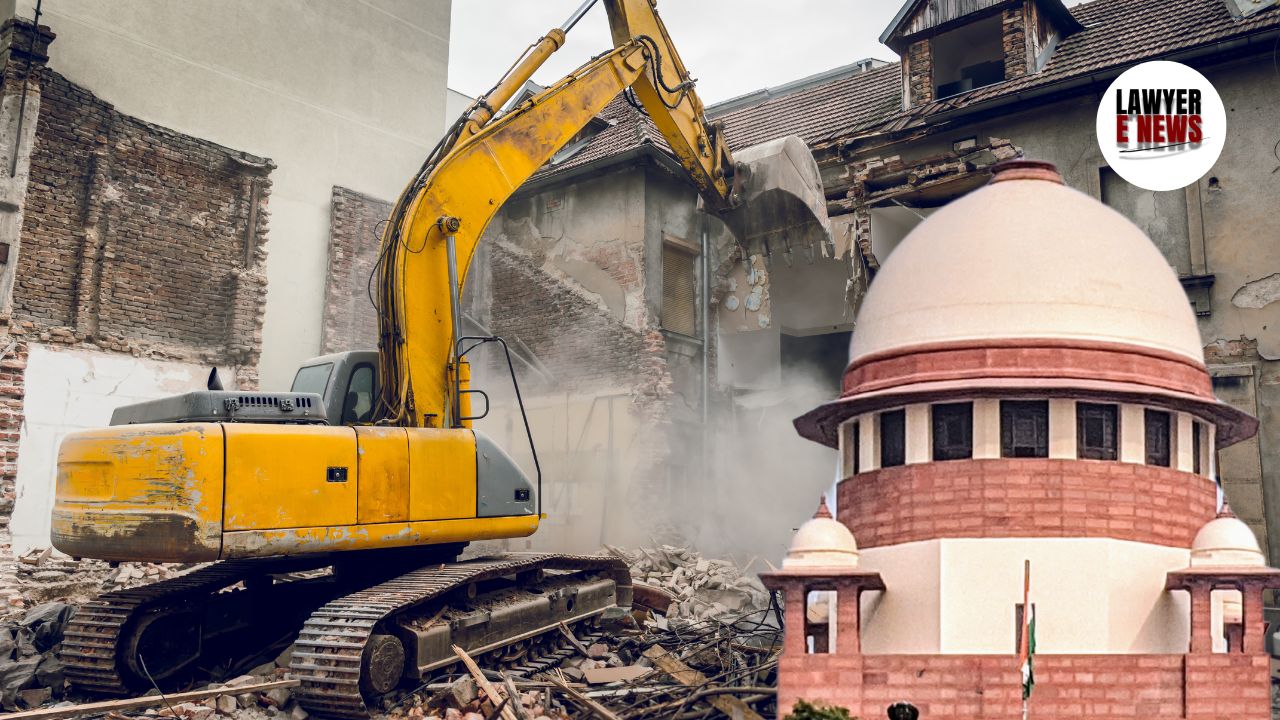-
by sayum
14 February 2026 2:22 PM



“Accusations Do Not Justify Demolitions: Due Process Is Essential,” Rules Supreme Court. On November 15, 2024, the Supreme Court of India delivered a landmark judgment in Writ Petition (Civil) No. 295 of 2022 and connected matters, addressing the contentious issue of demolitions linked to criminal accusations. The Court reaffirmed the primacy of rule of law, constitutional rights, and natural justice, while issuing exhaustive guidelines to prevent arbitrary state actions.
"Demolitions conducted without following due process of law or as a punitive measure against accused persons undermine constitutional values and the rule of law."
The case arose from a series of petitions filed under Article 32 of the Constitution, highlighting instances where properties were demolished without notice or adherence to legal procedures. The petitioners contended that state authorities were demolishing properties as punitive measures against individuals accused of criminal offences, bypassing judicial scrutiny.
Key petitions included challenges against actions by the State of Uttar Pradesh, which justified demolitions under municipal laws for removing unauthorized constructions. The petitioners alleged that demolitions disproportionately targeted individuals accused in criminal cases, violating their rights under Articles 14, 19, and 21.
The Supreme Court, through interim orders, had earlier restrained state authorities from demolishing properties without judicial approval. It invited suggestions from stakeholders to frame uniform guidelines for demolitions across the country.
The Court examined several critical legal principles, including:
Rule of Law – Ensuring accountability and fairness in executive actions.
Separation of Powers – Prohibiting the executive from assuming judicial functions.
Rights of the Accused – Upholding the presumption of innocence and constitutional protections.
Right to Shelter – Safeguarding the intrinsic dignity associated with housing.
1. Rule of Law
The Court emphasized that the rule of law mandates:
Equal treatment of all individuals.
Actions grounded in established legal principles, not arbitrary discretion.
Judicial oversight to prevent abuse of executive power.
"The rule of law is the cornerstone of democracy. Arbitrary demolitions by the state undermine public confidence in governance and erode constitutional values."
2. Separation of Powers
Highlighting the doctrine of separation of powers, the Court declared that the executive cannot act as a judicial authority by punishing accused persons through demolitions. It stated:
Punishment must follow judicial determination, not administrative fiat.
Executive overreach in assuming judicial functions violates constitutional norms.
"The executive cannot replace the judiciary in adjudicating guilt or imposing penalties, such as demolitions, without due process."
3. Rights of the Accused
The Court reaffirmed the constitutional rights of the accused, including:
Presumption of Innocence: No person can be treated as guilty until proven so by a court of law.
Right to Dignity: Even those accused or convicted of crimes retain their fundamental rights under Articles 14, 19, and 21.
"The rule of law ensures that individuals, even those accused of crimes, are protected from arbitrary and excessive actions by the state."
4. Right to Shelter
The Court highlighted the intrinsic link between housing and human dignity, emphasizing that demolitions:
Impact the stability and security of individuals and families.
Infringe on fundamental rights when conducted without legal justification.
Citing Lord Denning in Southam v. Smout:
"Even the poorest man may defy the forces of the Crown in his cottage unless the law justifies entry."
Guidelines Issued by the Court
The Supreme Court framed uniform guidelines for demolitions, ensuring procedural safeguards, accountability, and transparency. The key directives include:
A. Notice and Hearing
A detailed show-cause notice must be served to property owners/occupiers, outlining:
Alleged violations.
Legal provisions breached.
Opportunities for rectification or regularization.
A minimum response period of 45-60 days must be provided.
Affected parties must be granted a personal hearing.
B. Proportionality
Demolitions should be the last resort, applied only when violations are irredeemable.
Unauthorized structures on public lands (e.g., roads, waterways) may require shorter notices (48-72 hours).
C. Accountability
Arbitrary demolitions will attract:
Disciplinary action against erring officials.
Criminal liability for mala fide actions.
Victims of illegal demolitions are entitled to compensation for:
Reconstruction costs.
Relocation expenses.
Mental and reputational harm.
D. Transparency
Notices and demolition orders must be:
Publicly accessible on municipal websites.
Published in local newspapers.
Demolitions must be video-recorded to ensure compliance with guidelines.
The Supreme Court’s judgment serves as a critical reaffirmation of constitutional values, reinforcing the importance of due process, fairness, and accountability in state actions. By issuing these guidelines, the Court aims to curb executive excesses and uphold the rights of individuals, even in cases involving criminal allegations.
Date of Decision: November 13, 2024
